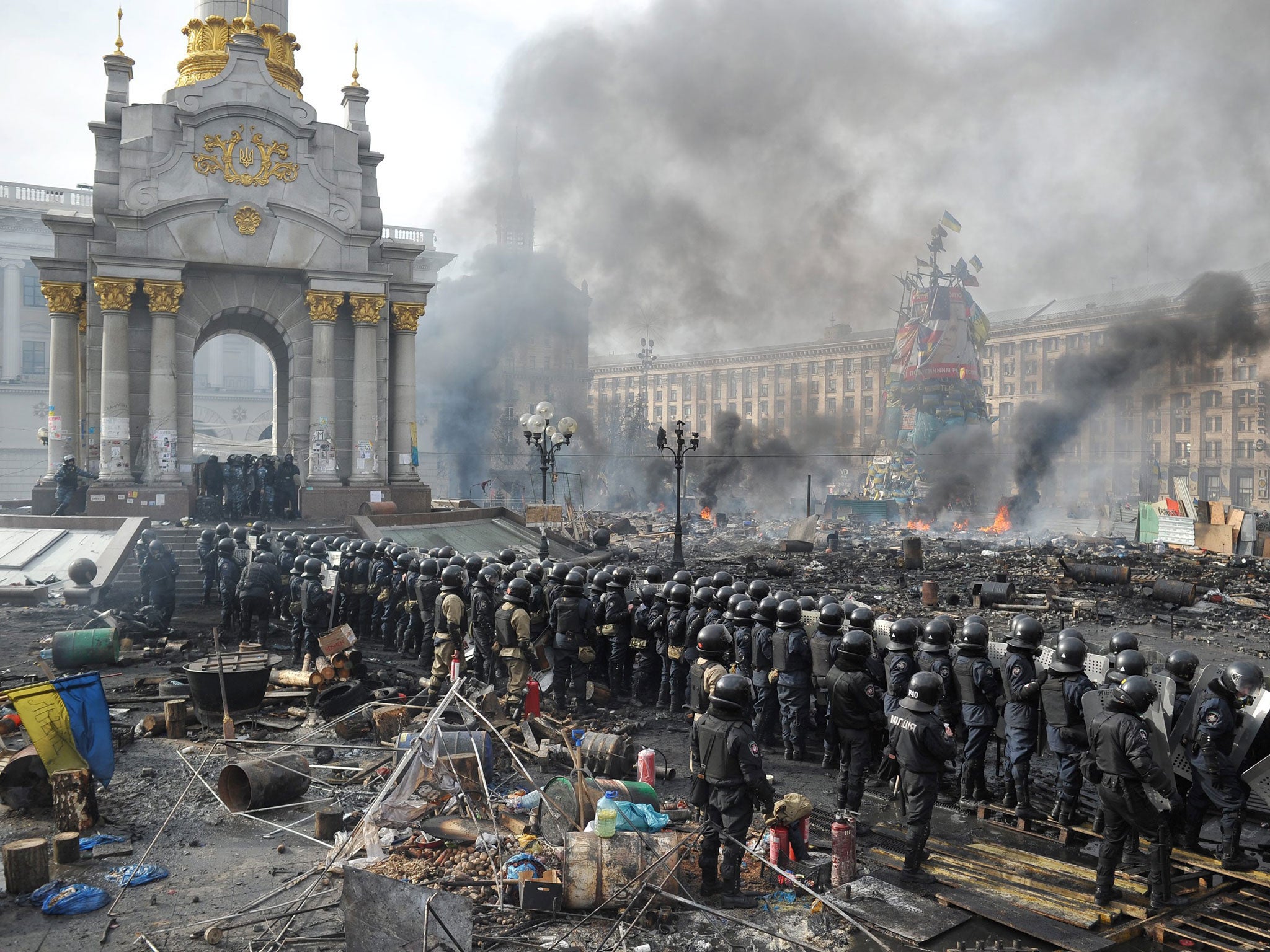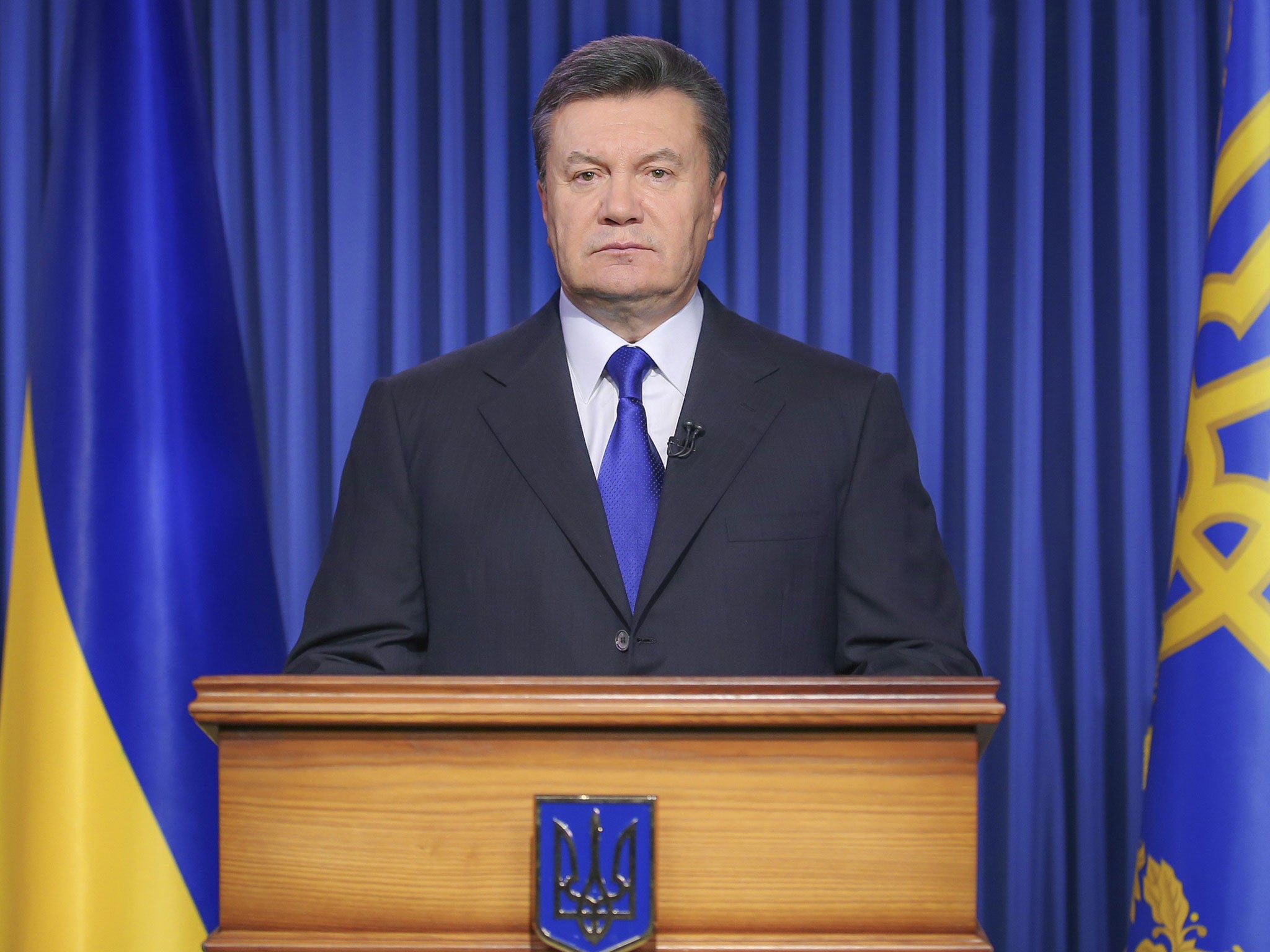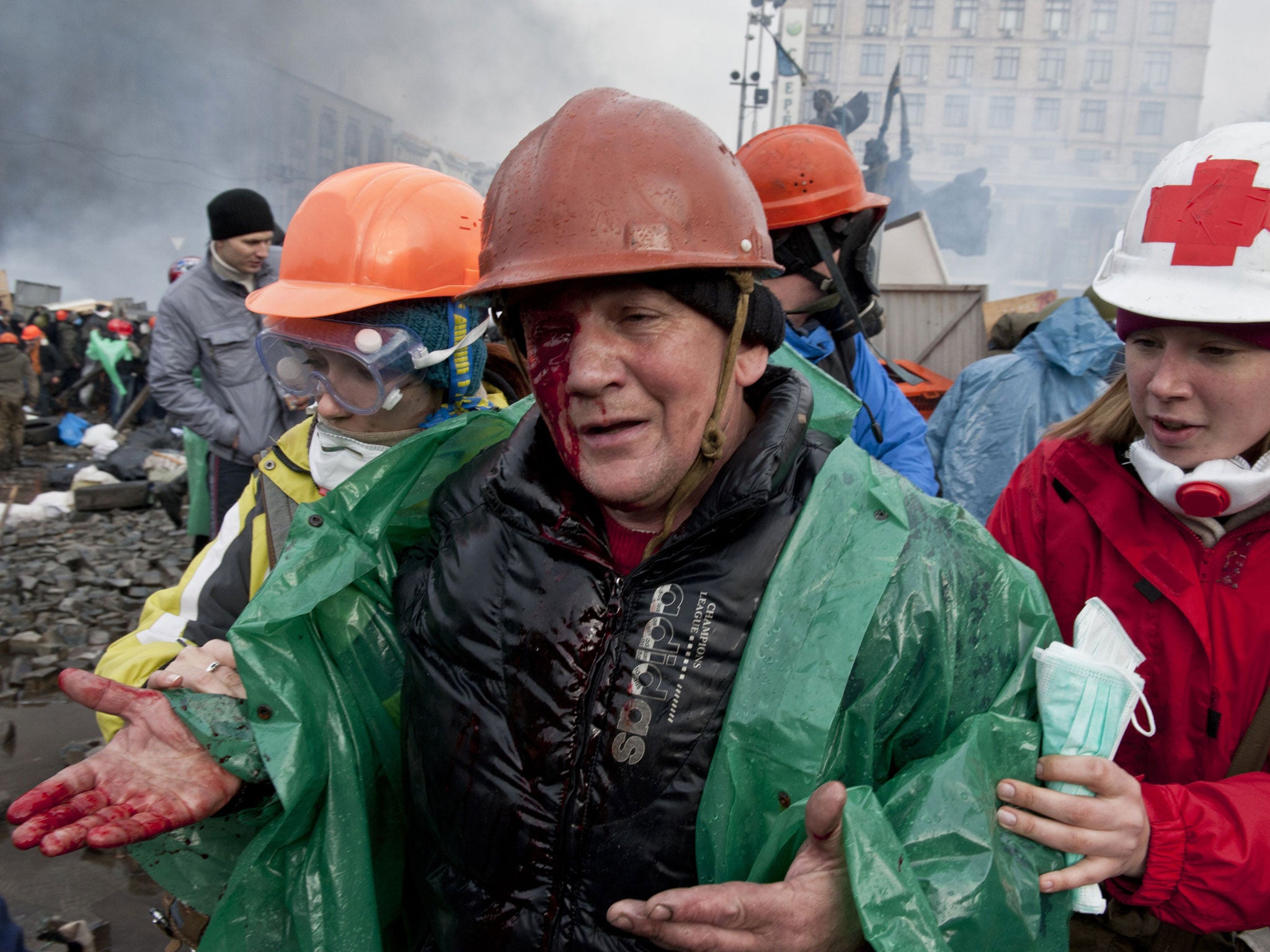Ukraine protests: President Yanukovych agrees 'truce' with opposition as EU ministers prepare to discuss sanctions
‘Yanukovych has blood on his hands,’ says Swedish Foreign Minister

Your support helps us to tell the story
From reproductive rights to climate change to Big Tech, The Independent is on the ground when the story is developing. Whether it's investigating the financials of Elon Musk's pro-Trump PAC or producing our latest documentary, 'The A Word', which shines a light on the American women fighting for reproductive rights, we know how important it is to parse out the facts from the messaging.
At such a critical moment in US history, we need reporters on the ground. Your donation allows us to keep sending journalists to speak to both sides of the story.
The Independent is trusted by Americans across the entire political spectrum. And unlike many other quality news outlets, we choose not to lock Americans out of our reporting and analysis with paywalls. We believe quality journalism should be available to everyone, paid for by those who can afford it.
Your support makes all the difference.Ukraine’s President Viktor Yanukovych announced that he had agreed a truce with opposition leaders on Wednesday night, amid global outrage over the deaths of 28 people in the government’s offensive against protesters.
Fires continued to burn overnight in Kiev's Independence Square, but no violence has been reported.
EU ministers are due to meet today to agree a package of sanctions and it was not immediately clear what effect the truce would have on those negotiations. Foreign ministers from France, Germany and Poland will meet with President Yanukovych this morning before flying to Brussels to join the rest of the EU ministers.
Mr Yanukovych said he and the opposition leaders had agreed to try to stabilise “the situation in the state in the interests of social peace”.
This came shortly after the president sacked the head of the armed forces, Col Gen Volodymyr Zamana, in a surprise move. He was replaced by the commander of Ukraine’s navy, Admiral Yuriy Ilyin, according to the president’s website. No official explanation was given for the move.
Swathes of central Kiev were transformed into fiery battlefields on Tuesday when police attacked the anti-government protest camps which have occupied Independence Square for nearly three months.
As violence stretched into Wednesday evening, explosions from police stun grenades echoed throughout the city centre and tear gas and black smoke filled the air. Protesters hurled fire bombs and rocks at riot police as they were encircled.

Dozens of injured protesters, many with bloody head wounds, were taken to makeshift medical centres, with more than 600 injured in total on both sides. The 28 confirmed dead include 10 police officers and one journalist.
A statement on the Ukrainian health ministry website said 88 police, six journalists and four foreigners were among the 287 hospitalised. Opposition activists, who have been treating wounded protesters in a downtown monastery, say the number injured is actually much higher.
The ferocity of the police assault provoked the strongest international criticism yet, with EU leaders promising sanctions after months of tiptoeing around the issue to avoid sending Mr Yanukovych deeper into Russia’s embrace. It was Mr Yanukovych’s decision to ditch a trade pact with the EU and turn to the Kremlin for economic aid that sparked the unrest.
“It was with utter dismay that we have been watching developments over the last 24 hours in Ukraine,” said Jose Manuel Barroso, the European Commission President. He vowed to pursue “targeted measures against those responsible for violence and use of excessive force”.
Poland’s Deputy Foreign Minister said the bloc had reached a consensus on sanctions. An extraordinary meeting of EU foreign ministers in Brussels today is expected to formalise exactly who will be affected by which measures.
While sanctions such as assets freezes can take months to take effect, visa and travel bans can be implemented quickly. The European Investment Bank has already suspended loans to Ukraine, and the US Secretary of State, John Kerry, said Washington was also considering sanctions.
Mr Kerry said he was hoping for a peaceful solution to the crisis. But with the opposition demanding the resignation of the government and Mr Yanukovych standing firm, there appeared to be little appetite for compromise in Kiev.
The Ukrainian President and his allies in Moscow have accused the opposition of trying to seize power by force. But many European leaders blamed the authorities for the escalating violence and said riot police should pull back.
President Yanukovych “has blood on his hands,” said Swedish Foreign Minister Carl Bildt. An EU spokesman refused to say whether the Ukrainian President would be the target of sanctions, but French Foreign Minister Laurent Fabius said: “There may be a whole scale of sanctions, including personal sanctions.”
However, analysts warned that the punitive measures may be too little, too late, however,. Until now, the EU has focused on offering financial incentives to Kiev. It has been competing with less nuanced pressure from Russia’s President Vladimir Putin, who is keen to see the protests swiftly brought under control so a pro-Moscow regime remains in place.

“If targeted measures had been used earlier, the EU might have been able to speak up more clearly and more robustly now,” James Sherr, an associate fellow at the Chatham House think-tank, told The Independent.
Defending its approach, an EU spokesperson said that it had been careful throughout the political crisis to respect “the European ambitions that Ukraine has” and to try to offer a path to greater integration “which would enable the Ukraine in the longer term to introduce a series of political and economic reforms”.
Russia kept up the pressure on Wednesday, with President Putin’s spokesman Dmitry Peskov calling the events of the past 48 hours a “coup attempt”. A Foreign Ministry statement blamed interference from Europe for the escalation of violence, saying politicians had “turned a blind eye to the aggressive actions of radical forces in Ukraine”.
While the public face of the opposition is the former boxer and moderate, Vitali Klitschko, and allies of the jailed former prime minister, Yulia Tymoshenko, nationalist and far-right groups have also been active around Independence Square.
The scale of the violence has provoked fears that the nation of 46 million could be heading into civil war, with much of the east still backing the government and favouring close ties with Russia.
The Ukrainian security service said that they were launching an “anti-terrorist” operation after claiming that protesters had seized hundreds of firearms. The Defence Ministry warned that soldiers could be deployed.
On Wednesday night, protesters remained in control of about two-thirds of Independence Square, also known as the Maidan. Despite the city’s metro system and many bus routes being shut down for a second consecutive day, protesters continued to spill on to the square.
Dozens appeared ready to go to battle, wielding baseball bats, metal pipes and an array of makeshift weapons. Several were carrying what appeared to be air rifles.
“We are revolutionaries, and this is a revolution,” Vitaliy Moroz, a 21-year-old Kiev university student, told The Independent as he prepared another Molotov cocktail. “We are fighting for our future.”
Nearby, pensioner Olga Shevchenko gathered paving stones dug up by protesters and passed them to an elderly man next to her, sending them up to the front lines where others were heaving them into the police ranks.
She said she left her home with her husband in Ternopil Oblast in western Ukraine and joined the protest movement in late January. “I can’t throw these stones, but I can carry them,” she said.
Join our commenting forum
Join thought-provoking conversations, follow other Independent readers and see their replies
Comments